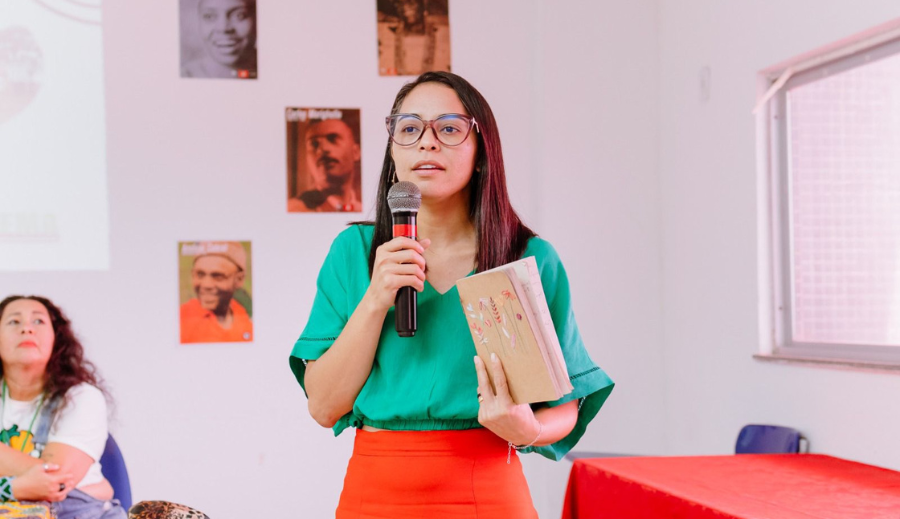By Laura Guido and Samantha Mendes, journalism interns, supervised by Carla Fischer
The International Day of Women and Girls in Science, celebrated on February 11, was established by the United Nations (UN) in 2015 with the aim of recognizing and promoting the role of women in scientific production. The date also seeks to combat historical gender inequality in the academic and scientific fields. According to data from UNESCO, only 33% of researchers in the world are women, highlighting the challenge of female inclusion in science.
In the Amazon, the presence of women in scientific research is essential for understanding the socio-environmental dynamics, biodiversity and traditional populations of the region. To increase this visibility, Amazônia Vox brought together Amazonian researchers who have made significant contributions to science and local reality.
Science as a tool for struggle

Among these scientists is Ariana Gomes, from Maranhão. A member of the babassu coconut breakers' collective, she sought science as a means to document and strengthen her people's struggle. "The research reveals the urgent need for FUNAI to demarcate this multi-ethnic territory, so that the indigenous coconut breakers, as well as the entire people, can reproduce their social, cultural, economic and environmental ways of life. They are guardians of the territory, of common goods and of socio-biodiversity," Ariana highlights.
Recognizing the importance of these scientists, the bank of Amazon Vox Knowledge Sources presents a list of female researchers from some states in the Legal Amazon, who work in different areas of knowledge. The objective is to give visibility to the work of these scientists, promote female protagonism in science and inspire future generations of girls to enter the world of academic research.
Amazonian researchers who make a difference
Amazonas - Mary of Perpetual Help Rodrigues Chaves - Full Professor at the Federal University of Amazonas (UFAM), she holds a degree in Social Work, a master's degree in Rural Sociology from the Federal University of Paraíba (UFPB) and a PhD in Science and Technology Policy from the State University of Campinas (UNICAMP). Her research focuses on traditional peoples, sustainability, innovation and social technology in the Amazon, with a focus on valuing ancestral knowledge and strengthening public policies that promote sustainable development in the region. In addition, she works to coordinate academic and community initiatives that increase the participation of Amazonian populations in the production of knowledge.
Maranhao - Ariana Gomes - A babassu coconut breaker, social worker and master in Social and Political Cartography of the Amazon from the State University of Maranhão (UEMA). Her research documents and analyzes the struggles and resistance of the indigenous Akroá Gamella coconut breakers in Viana, Maranhão, highlighting the importance of demarcating traditional territories and preserving the ways of life of these communities. Ariana uses science as a tool to strengthen the cultural identity and socio-environmental rights of women who play an essential role in protecting local biodiversity.
Mato Grosso - Rafaella Teles Arantes - Professor at the Federal University of Mato Grosso (UFMT), Sinop Campus, she holds a PhD in Plant Physiology from ESALQ/USP, with a sandwich period at the Valencian Institute of Agricultural Research, in Spain. She leads the research group "Family Farming, Agroecology and Organic Agriculture in Mato Grosso" and coordinates the Gaia Project – Cooperation Network for Sustainability, which supports food production in agroecological and organic systems alongside family farming. She works in the areas of agroecology, agroforestry systems, food security and sustainability.
Tocantins - Etiene Fabbrin - PhD in Science from the Federal University of Rio Grande do Sul (UFRGS) and professor at the Federal University of Tocantins (UFT). She works in the area of paleobotany, teaching paleontology and teacher training, contributing to the appreciation of the natural history of the Amazon. Her research involves the study of plant fossils from the region, helping to reconstruct the landscape and climate of the Amazon's past, in addition to developing teaching materials for science education.
Rondônia - Adriana Cristina Nunes - Professor and researcher at the Federal University of Rondônia (UNIR), working in the area of biotechnology and microbiology. She researches microorganisms with biotechnological potential in the Amazon, exploring their applications in health, agriculture and industry. Her work seeks sustainable alternatives for the development of bioinputs and bioproducts that can benefit local communities and strengthen the Amazonian bioeconomy.
Roraima - Ise de Goreth - PhD in Biological Sciences and professor at the Federal University of Roraima (UFRR). She researches the flora of Roraima, cataloging medicinal plants used by indigenous communities. Her work is essential for the valorization of traditional knowledge and the development of new phytotherapeutic products, promoting the conservation of biodiversity and the sustainable use of natural resources.
Para - Ana Luisa Fares - A researcher at the Federal University of Pará (UFPA), she works in the areas of engineering and environmental sciences, with a focus on the management and conservation of water resources in the Amazon. Her research includes the development of technologies for the treatment and reuse of water, as well as sustainable solutions for supplying riverside communities. She works at the intersection of technological innovation and environmental preservation, contributing to more sustainable public policies and practices in the region.
Amapá - Amanda Alves Fecury - Biologist and PhD in Ecology, specializing in aquatic ecosystems and the environmental impacts that affect Amazonian rivers. Her research involves preserving aquatic biodiversity and monitoring the effects of climate change on water resources. In addition to her scientific work, Amanda works directly with riverside communities, developing environmental education projects and promoting sustainable practices for the conservation of rivers and the life that depends on them.
Acre - Gleiciane de Oliveira - Social scientist from the Federal University of Acre (UFAC) and master's student in Sociology at the Fluminense Federal University (UFF). She researches the impacts of the COVID-19 pandemic on quilombola communities in the Brazilian Amazon. She is a member of the Research Group Worlds of Work in the Amazon (GPMTA-CNPq-UFAC), focusing on the sociology of work, risk, and intersections of gender, race/ethnicity, and class. She worked as an assistant researcher on the international project MAP-Fire and as a consultant at the United Nations Population Fund. She is currently collaborating on the multinational project "Voices of Recovery", which investigates the effects of the pandemic on quilombola communities in Pará.




